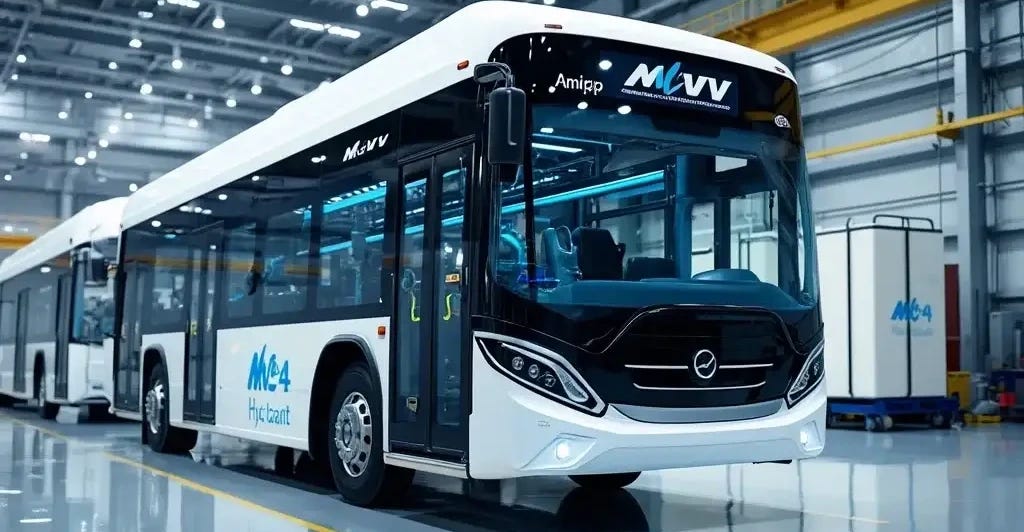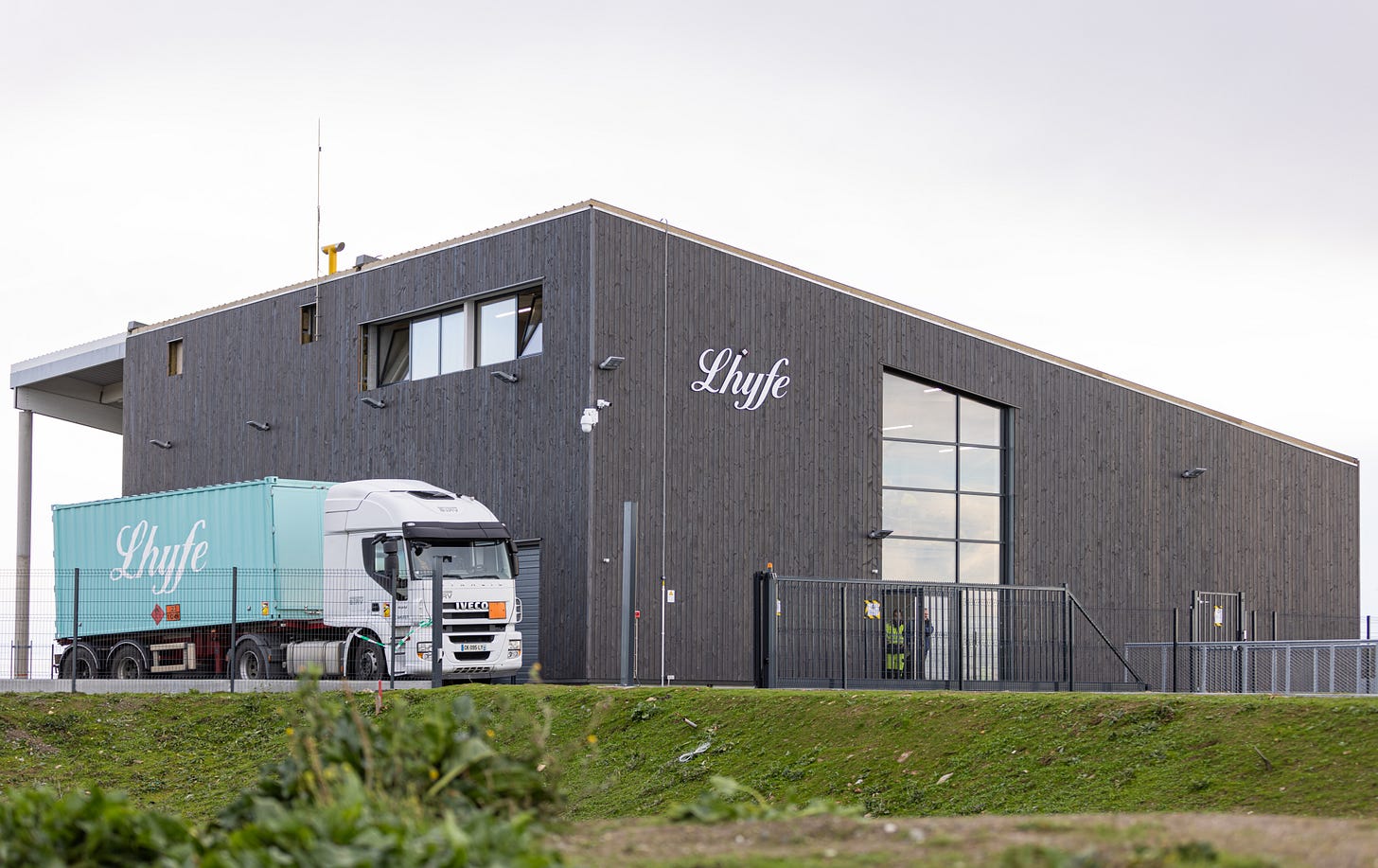World’s First Liquid Hydrogen Corridor to Connect Oman, Netherlands, and Germany
Also, Lhyfe lands €149 million to support the construction of a major electrolyser in Normandy
News to watch closely…
Toyota Motor Corporation launches hydrogen joint venture with China’s state-owned Shudao Group. The newly formed Shudao Toyota Hydrogen Energy Technology Co., Ltd., located in Chengdu's Qingbaijiang District in southwest China, has an initial investment of 1 billion yuan (approximately $145 million). The venture seeks to produce and commercialize hydrogen fuel cells for large-scale applications in heavy-duty trucks, buses, and specialized equipment, with a push to the growth of hydrogen economies in the region.
France’s hydrogen developer Lhyfe secures €149 million in state aid to support the construction of a major 100-MW electrolyser near the Grand Canal du Havre in Normandy. This funding, provided through a contract with Bpifrance, will be distributed over four years, with the first tranche of €18 million set to be disbursed by June 2025. The electrolyser, slated to begin operations by 2029, will produce up to 34 tonnes of green hydrogen daily with a facility spanning 2.8 hectares.
A groundbreaking joint development agreement (JDA) has been signed to establish the “world’s first” liquid hydrogen corridor, linking Oman’s Port of Duqm, the Port of Amsterdam in the Netherlands, and the Port of Duisburg in Germany. This ambitious project involves prominent players such as Oman’s green hydrogen orchestrator Hydrom, energy group OQ, Dutch steel producer Tata Steel, logistics company Hamburger Hafen und Logistik, and Hynetwork. The agreement outlines the development of several critical components necessary for the corridor's functionality. These include a centralized liquefaction, storage, and export facility at Oman’s Port of Duqm and dedicated infrastructure at the ports of Amsterdam and Duisburg for importing and distributing the hydrogen. Key German logistics aggregator EnBW will oversee hydrogen delivery to various offtakers in the Netherlands and Germany.
TotalEnergies has applied for an environmental permit for a $16 billion green hydrogen and ammonia project in southern Chile, anticipated to begin operations by 2030. Led by its Chilean subsidiary, TEC H2 MAG, the ambitious project includes a wind farm, seven electrolysis centers for green hydrogen production, a desalination plant, an ammonia plant, and maritime infrastructure for exporting green ammonia. The ammonia facility is expected to achieve a production capacity of up to 10,800 metric tons daily.
Maritime
Shipowners will face financial accountability for greenhouse gas emissions due to new rules agreed by the International Maritime Organization (IMO) will require shipping companies to pay for the carbon dioxide (CO2) their vessels produce starting in 2028. The regulation incorporates greenhouse gas charges that increase above certain emission thresholds and a carbon credit trading system. It is hoped that the estimated $10 billion annual revenue will remain within the shipping sector, supporting the adoption of cleaner technologies such as green ammonia.
The Port of Rotterdam has successfully conducted an ammonia bunkering pilot. This operation, carried out in partnership with Trammo, OCI, and James Fisher Fendercare, involved transferring 800 cubic meters of liquid ammonia at -33°C between two ships in just 2.5 hours. The pilot, performed at Maasvlakte 2 APM terminal, proved the safety and efficiency of ammonia bunkering, validating the port's comprehensive safety framework.
Switzerland’s Viking and Italy’s Fincantieri have announced the introduction of the Viking Libra, the world’s first hydrogen-powered cruise ship. Set to debut in late 2026, the Viking Libra will boast a hybrid propulsion system that combines liquefied hydrogen and fuel cells, making it capable of operating with zero emissions. The Viking Libra will be a midsize ship with a gross tonnage of 54,300, offering 499 staterooms and accommodating nearly 1,000 guests. The Viking Astrea, another hydrogen-powered ship currently under construction, will follow in 2027.
Spain is set to establish its first offshore green hydrogen plant near Gran Canaria, a project under the H2VERDE initiative led by the Oceanic Platform of the Canary Islands (PLOCAN). Supported by €6 million in funding from the Canary Islands government and the EU’s Recovery and Resilience Facility, the facility will harness solar, wind, and marine energy to power an electrolyser capable of producing up to 15,000 kilograms of green hydrogen annually. The plant will serve as a testbed for decarbonizing isolated energy systems, supplying hydrogen for port operations, marine vehicles, and industrial equipment.
The Monaco Hydrogen Alliance is delighted to announce the signing of a Memorandum of Understanding (MoU) with the International Hydrogen Fuel Cell Association.
This partnership seeks to foster closer collaboration between the two organizations to drive innovation in green hydrogen and mobility solutions. Together, we aim to build a stronger global alliance dedicated to advancing hydrogen and fuel cell technologies, with a particular focus on renewable hydrogen production, mobility applications, infrastructure development, and standardization.
📅 Don’t miss the upcoming International Hydrogen and Fuel Cell Vehicle Congress & Exhibition (FCVC) from June 18 to 20 in Shanghai, organized by the International Hydrogen Fuel Cell Association, where industry leaders will connect and discuss the future of hydrogen innovation !
Learn more about IHFCA
Land Transportation

Hexagon Purus has entered the North African market through a partnership with Egypt’s Manufacturing Commercial Vehicles (MCV). Under this agreement, Hexagon Purus will supply advanced hydrogen storage systems for MCV's new fleet of hydrogen-powered buses. These systems, featuring lightweight and durable Type 4 composite pressure vessels, are designed to store hydrogen safely at high pressure and stand up to the daily rigors of public transportation.
Wrightbus has announced a £25 million investment in research and development to advance zero-emission public transport. The Northern Irish company’s initiative focuses on the development of both battery-electric and hydrogen fuel cell technologies. A key focus is the creation of a hydrogen-powered coach, benefiting from £5 million of the R&D fund. Expected to launch in the next 18 months, this innovative coach is designed to travel up to 1,000 kilometers on a single hydrogen refuel.
What we’re reading:
A Cornell-led team has developed a prototype device that uses solar-powered electrolysis of seawater to produce low-cost, carbon-free green hydrogen and potable water simultaneously. This innovative technology, expected to significantly reduce green hydrogen production costs to $1 per kilogram within 15 years, holds promise for advancing sustainable energy and addressing global water scarcity challenges.







